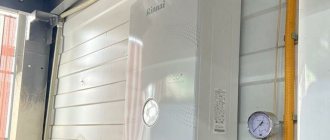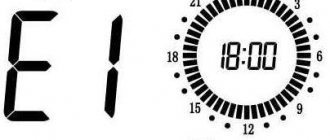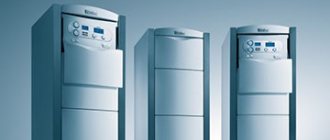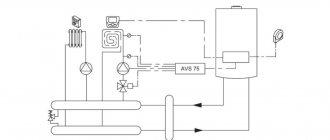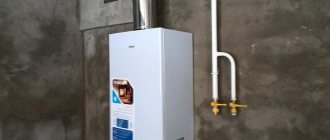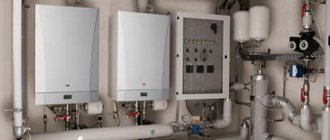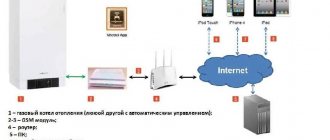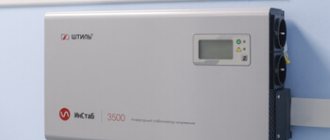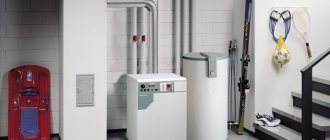BaltGaz is an exemplary brand that produces comfort and premium level gas appliances with a high class of reliability. All of them are equipped with high-tech functions and protection, and have a large number of accessories and spare parts. But just like any other devices of this type, boilers from the Baltgaz company may develop malfunctions over time. Fortunately, for the convenience of diagnosing emerging problems, they have the function of automatically recognizing system weaknesses and errors in Baltgaz gas boilers are displayed on the display in the form of alphanumeric codes.
Programmed diagnostics using sensors helps to quickly identify weak areas of devices and eliminate malfunctions immediately as they arise.
Do you want to know how to understand these codes, which will seem completely incomprehensible to many? We will help you and tell you what these letters and numbers are and how to correctly decipher the codes of BaltGaz gas boilers.
BaltGaz boiler errors
Deciphering error codes for Baltgaz Turbo gas boilers can be found in any operating instructions. However, if your manual is lost, damaged, or there is some other reason why you cannot look at it, use our recommendations.
You should not fix errors that require intrusion into areas of the boiler subject to warranty repair before the boiler warranty expires, otherwise you will be denied free service
Let us immediately note that only those errors that you can deal with without disassembling the boiler or changing spare parts can be corrected independently.
Repair of gas-using equipment has the right to be carried out only by an employee of the gas service or a company with which an agreement has been concluded for the maintenance of gas equipment.
Problem No. 1 - difficulties with ignition
If you see error E01 , this means that you have problems igniting the boiler. The ionization sensor, which monitors the ignition control, signals you about this. You yourself already guessed that there was a malfunction when an attempt to ignite the device did not bring results. But with the help of an error, you can identify possible causes.
No fuel is supplied to the burner at all. You should look to see if the shut-off valve on the pipe is closed and, if so, turn it to the “open” position. When starting the device for the first time, do not forget to first bleed the air from the system.
Pay attention to the recommended pressure - 18-20 mbar. If everything is in order on the line, test the pressure adjustment on the injectors according to the operating instructions for the device.
Another common cause is a broken gas valve, and in the event of such an incident, the element should be replaced.
E01 is often observed when the ionization electrode that performs ignition malfunctions. It may be dirty (wipe and degrease) or defective.
The cause of problems with ignition may be an incorrect distance between the ionization electrode and the burner, which is easy to install and correct the distance (3+1 mm)
When there is a problem with the gas valve coils, this indicates a possible short or open that will require valve replacement. But it can also start to stick.
If the ignition power is unsatisfactory, use the settings to correct it.
A clogged burner block requires cleaning, instructions for which are usually in the manual.
If the ignition transformer is faulty, you should consider replacing the electronic board. The same applies if it breaks. But if the board sees combustion, but in fact there is none, you need to inspect the ionization electrode, or rather its wiring, for damage or a possible break.
The boiler also contains such an element as a thermal relay. This is an overheat sensor. If its operation is disrupted, ignition will be impossible, so it is necessary to carefully check the electrical circuit and all contacts.
Error E01 is accompanied by K1. That is, after correcting the malfunction, it must be pressed. It has 2 functions - selection of information mode and manual reset function (RESET) of the lock.
E02 indicates that a false combustion indication has been made due to blocking. The boiler does not work.
First of all, check the electrical circuit of the electrode and the contacts from its connection. If the element itself is faulty, it is recommended to replace it.
As with E01, an incorrect gap between the torch and the electrode can also cause an error to appear on the display. To eliminate it, the steps are similar - you need to set the gap (3+1 mm).
You should not rely only on instructions from the Internet if a boiler breakdown requires special knowledge. It is best to invite a specialist to diagnose and repair any problems that may arise.
If the grounding is broken or potential arises between ground and zero, E02 will “tell” you about it. The correction is logical, correct the grounding and remove the potential.
After the repair is completed, also press K1.
Error code F02 is directly related to error E02 and also indicates a stray flame.
This starts:
- violation in the chain communication of the electrodes;
- malfunction of electrodes;
- incorrect setting of the clearance distance between the burner and the electrode;
- poor grounding and potential between ground and zero.
This is a prerequisite for the appearance of error E02.
With E08 , by the way, K1 is not required to be pressed. But the error is no less important in its significance. Let's look at what it signals and how to fix it. When this code occurs, the flame circuit fails, that is, its level goes beyond normal limits.
Let's look at the electronic board. The reason may lie in its malfunction.
As always, first of all we check all the contacts and the electrical circuit of the electrode, as well as the element itself and, if necessary, replace or clean it.
Then, you should check the gap between the burner and the electrode and, if necessary, set it to the optimal values according to the passport (3+1 mm).
Designations: 1 – thermocouple, 2 – piezo electrode, 3 – igniter. The ignition unit is a device in which the igniter, thermocouple and spark/ignition plugs are secured. To ignite a flame in the boiler, it is necessary to maintain a gap of 3+1 mm between the ignition electrode and the burner
Error code E09 means that the gas regulator feedback does not comply with the commands coming from the device’s electronic board.
There may be 3 reasons:
- Disturbances in the contacts and electrical circuit of the regulator.
- Problems with the electronic board.
- Damage to the regulator itself.
If you cannot diagnose and fix the problem yourself, call a service specialist.
Error E82 indicates frequent flame extinguishing. This usually happens in a row with short breaks. The problem may be a failure of the electronic control board, as well as in many other cases.
What can be done:
- completely replace the electronic board with a new one;
- try contacting a repair service;
- restart your heating unit, sometimes such problems are one-time and go away on their own.
There is another possible reason, and it lies in the settings when the minimum boiler power is set incorrectly.
Sometimes there is a random failure in the electronic module of gas boilers, which is registered as a system error. For almost every error, except for draft problems, leaks and power supply, you can simply try to restart the boiler. If the error repeats, then the boiler definitely needs repairs.
Here it’s even easier to correct the situation, just look at the manual and set up the boiler according to the manufacturer’s recommendations. If you don’t have your passport, you can download almost any instruction via the Internet.
Problem No. 2 - failures in the heat exchanger
Error code E03 will prevent the boiler from working. Such malfunctions of Baltgaz gas boilers mean overheating of the coolant. This occurs due to a number of possible reasons. In general it looks something like this.
The safety thermostat is usually set at 105 degrees. As a result of an increase in temperature, the nozzle goes out, but the heat exchanger continues to heat up. If after 10 seconds the temperature rises beyond 105 degrees, a protective shutdown of the boiler will occur for a short time.
The overheating thermostat located on the outlet pipe of the primary heat exchanger will display its functions and send a signal to the control board. Therefore, if there is no effectiveness and the temperature drops to 100 degrees, an error will appear.
For example, you will see such a code when blockages appear in the heating system or filter, which must be cleaned to eliminate the error.
Do not forget to check the thermal relay, and if necessary, replace it or ensure its good contact with the control board.
Before eliminating possible malfunctions, you should carefully study the gas boiler diagram, which is in each passport. But in general, it is recommended to entrust global repairs to specialists, especially since such work cannot be carried out by law without special permission
Still haven't found the reason? Then pay attention to the bypass valve, which may be faulty or incorrectly installed. It needs to be replaced, just as you need to change the pump or air bleed valve if the reason is their failure.
Failure and malfunction of the electronic control board fit many errors. Including this one. Accordingly, the board is usually replaced; it can be repaired in rare cases.
As with error E01, there may be a break in the electrical circuit of the overheating sensor. Pay attention to this possibility and inspect everything carefully. And, of course, don’t forget about the K1 button. In this case it is also relevant.
Error E70 also leads to blocking of work, and requires a subsequent reset to K1.
The error means recognition of the heat exchanger freezing, which mainly occurs during a prolonged power outage. The error is easily prevented by the presence of an uninterruptible power supply, but if you do not have one, you will have to turn off the power supply to the device, turn off the gas supply to the pipe and then defrost the element.
When the coolant temperature in the heating system is less than +3 degrees, the pumping equipment will turn on for 3 minutes. When the boiler burner is running, it will turn off and will not be ignited. If, after this time, the coolant warms up by 1 degree, the boiler’s operation will be restored; if not, it will be blocked with an error message.
When propylene glycol is used as a coolant, the parameters must be set to zero for this function, according to the recommendations in the device passport.
Error code F37 helps determine that the coolant pressure in the system is too low. And the first thing you need to do is measure it and correct it to the recommended value.
The pressure switch monitors the minimum coolant pressure and eliminates airiness in the heating system. If it breaks down or the connections are faulty, error F37 may appear on the display.
Other possible reasons:
- air jams;
- problem with the pressure sensor;
- The electrical circuit leading from the pressure sensor to the board is faulty.
As always, we check all the specified parameters and troubleshoot problems.
Problem #3 - incorrect traction
Errors code E04 and E05 stem from blocking F23 and mean that you have poor traction. In order for the boiler to work correctly, as is known, it needs to provide good draft, which facilitates the removal of flue gases.
If they do not come out well, carbon monoxide will enter the room, which is very dangerous. In modern boilers, special draft sensors monitor this and if it is not enough, they will send a signal to the board and the unit will automatically turn off.
First of all, the reason for such an error is in the chimney. If its diameter is unacceptable, or the device is installed incorrectly, is clogged, or ice has formed in it, of course, the traction will not be good. This is also affected by the length of the smoke exhaust pipe.
Elimination of errors E04 and E05 associated with the chimney system must be carried out according to the manufacturer’s recommendations. How to properly install a chimney pipe on a specific device can be found in the instructions for the gas boiler.
Of course, the solution here is obvious - replacing the chimney if necessary or cleaning it, as well as installing a deflector. But these are not all possible reasons.
Also, this error indicates problems with the pressure switch, most often, the closure of its contacts, which must be checked and, if necessary, replaced the pressure switch or connected correctly. If the pressure switch tubes are not sealed, replace them. Don't forget to inspect the electrical circuit as well.
If elements such as the fan and electronic board are faulty, replacement will most likely also be required.
Errors E04 and E05 differ in that in the first case the pressure switch is usually closed, and in the second it is jammed. And with E05, do not forget about the lock, which must be removed by pressing K1 RESET .
The meaning of E06 is very similar due to blocking with E04 and E05. That is, there is also no traction.
The steps for checking and troubleshooting are still the same:
- check the electrical circuit and contacts (replace if necessary);
- inspect the fan;
- diagnose the pressure switch;
- ring the control board.
E07 - still no traction. But this time the problem with the fan occupies the main place in the symptoms.
When error E07 appears, it is recommended to carefully inspect the fan, all its connections, impeller, shaft and other elements. Unfortunately, most often the malfunction requires replacement of this part.
What problems can occur with this element:
- the control board is acting up (if necessary, it will have to be replaced);
- the fan breaks - damage, lack of lubricant for the shaft, clogging in the impeller;
- the electrical circuit is broken.
Well, don’t forget about unblocking K1.
Error code F23 is accompanied by a complete loss of traction, its absence. First of all, check the pressure switch and if it malfunctions, be sure to replace it. Then they look at all the electrical circuits and contacts, and then the main elements - the fan, the electronic board.
Problem #4 - electronics failure
E09 and F25 are always a replacement of the electronic board due to an error in its internal memory.
Be careful! On the Internet and in many regular stores they offer supposedly universal electronic boards for purchase. You should buy special ones designed for specific devices, and only in the absence of the necessary spare parts can you consider other options, and then under the supervision of a specialist
By the way, note that blocking does not occur, that is, you do not need to press K1 after eliminating the malfunction. But the boiler still does not function during the period after this malfunction is detected. F25 indicates a failure of the internal ROM and EEPROM memory.
E21 is again associated with the electronic board and indicates an error in checking its components. Unfortunately, if there is a malfunction, you will have to change it; you can only hope that the problem is in the electrical circuit or contacts.
The good thing is that Baltgaz produces spare parts for its gas boilers and they are easy to purchase in regular or online stores.
F13 is also called remote reset lock. It is necessary to turn off the power supply to the device and restart it again after turning it on.
F22 indicates a voltage surge of 170 - 250 V. To restore the boiler’s operation, it is necessary to adjust the voltage.
In general, such work is difficult to carry out without any experience in handling gas-using equipment. It is best to call a technician from the service department or a specialist from the supplier's gas distribution department.
Problem No. 5 - irregularities in the temperature sensor
F31 and F32 - heating circuit temperature sensor failure.
The error may be temporary and after 5 seconds your boiler may resume operation again, but just in case, check for condensation on the sensor connector to the controller. If there is no moisture and the boiler does not start on its own, it is recommended to replace the sensor
F31 occurs due to breaks in the element connection circuit, when the sensor is no longer in contact with the electronic board or the temperature readings differ from the recommended parameters.
But there is another reason - a short circuit on the sensor if the temperature rises above the recommended one. To check, you need to measure the resistance of the element, and all the specified parameters are in the manual. Usually in this case they install a new sensor; if that doesn’t work, pay attention to a failure in the control board.
Code F32 is also associated with a temperature sensor, only external, remote, if it is installed in the system. No matter what, the boiler works actively to heat. The reasons are a malfunction in the electrical circuit, a breakdown on the board or the sensor itself. It should be noted that the error will be removed automatically and unlocking will not be necessary after the problem is resolved.
Low coolant pressure
On the front panel of each boiler there is a pressure gauge indicating the pressure in the heating system. It has red zones for readings that are too low and too high. A pressure of 1.5 bar is considered normal for a cold boiler: at 1 bar the arrow is already in the red zone, and at 0.5 bar the boiler will turn off due to a CE or CF error until the pressure is restored.
If the boiler was installed recently - a few weeks ago, this situation is common, you just need to add clean water through a special tap. But do not rush to add water to a system that has been in operation for several years.
When water heats up, it expands and the pressure rises - this is the norm. However, if it immediately jumps by 0.7 - 1.5 bar, this indicates a lack of air in the expansion tank.
If in such a situation you add water, heating up, it will increase the pressure too much and the safety valve will operate, releasing excess coolant.
The built-in expansion tank differs from the external one: it is flat and located at the back of the boiler. Inflator fitting – on top, with a threaded cap
To pump up the tank, you first need to relieve the pressure on the switched off boiler by draining some water. Then connect the pump or compressor to the fitting at the top back of the tank and pump it up to 1.3 - 1.4 bar. After turning off the pump, add water, bringing the pressure in the cold system to 1.5 - 1.6.
If even when the boiler heats up, low pressure in the heating circuit remains, then it is really necessary to add water. Where to find the tube intended for this is indicated in the instructions for the device model, but we will only remind you of the need to fill this tube with water before opening the tap so that air does not get into the pump and batteries.
Be sure to check all the taps, connections and radiators, as well as the insides of the boiler for leaks - the water circulating in the system has gone somewhere.
Other boiler faults
In addition to code settings, problems that are not recorded on the display may also arise.
If you smell gas, you need to shut off the burners not only on the Baltgaz boiler, but also on the gas stove and close the shut-off valves on the gas pipelines. After that call 04
The boiler does not turn on at all.
Possible reasons:
- No power supply. Check that the line is not de-energized and that current is being supplied. No - contact your electricity supplier to determine the reasons and timing of the outage.
- Also, the fuse on the board could have blown, in which case they simply install a new one.
- If the reason is that water has gotten on the board, try leaving it to dry naturally for 48 hours until the moisture has completely evaporated.
- The boiler does not start even if there is a failure on the control board. Try restarting or replacing this item
If the actions do not bring any positive results, there is only one way out - contact the service center.
If you are unable to light the boiler, first of all pay attention to whether you forgot to open the gas supply valve located on the pipeline leading to the boiler
The burner makes strange noises, like popping noises:
- Insufficient air supply occurs when the duct is clogged, improperly installed, or due to other reasons.
- The spark jumps past the burner.
- The burner is clogged.
There is no hot water or its pressure is insufficient. Check the filter, heat exchanger and flow restrictor for blockages.
The device does not heat the room, but operates in DHW mode. The problem may be related to jumpers, a malfunction of the thermostat and temperature sensor, or simply to incorrectly set temperature parameters.
The coolant inlet temperature is too low. Check the set temperature and temperature sensor.
The heating system pressure is too low. The system should be inspected for possible leaks, the pressure gauge should be checked for correct operation, and the safety valve should be cleaned/replaced.
Connecting a room thermostat
A room thermostat allows you to more accurately adjust the indoor microclimate. Its sensor checks the air temperature, which gives more accurate results than checking the extract air temperature, which is produced by the boiler electronics.
Using a room thermostat allows you to turn off the boiler when the set values are reached, when the device’s own sensors are not yet ready to give a command to stop heating.
The thermostat is connected to a special gap in the control board, the contacts of which are closed by default with a jumper.
To connect, turn off the boiler, open the lid and remove the jumper. Then the room thermostat is connected in the required order and a test switch is performed.
If the device operates normally, close the lid and proceed to further operation of the boiler with additional equipment. If problems are found, they are corrected immediately.
IMPORTANT! Detailed instructions for connecting a room thermostat are available both on the device itself and in the user manual for the boiler. Under no circumstances should you act at random.
Error code archive
You can look at the archive of errors and blockages on the boiler.
Error codes appear on the display of the Baltgaz gas boiler. Pay special attention to the K1 button, through which the blocking that occurs after some errors will be reset, and to other buttons with the letter “K”, which will not only control the hot water supply and heating, but also navigate through the settings, for example, access to the error archive
Unfortunately, the error archive is not provided for all models of gas boilers.
To access the archive, proceed as follows:
- Plug in the gas boiler.
- Press the “reset” button (K1). Hold it down for 10 seconds to activate some boiler functions.
- Using buttons K5 and K6 you need to get into the H1 archive.
- When In appears on the display, press K1.
- To select the item you need in the archive, navigate through the menu using K5.
- After selecting the desired parameter, you must press K3 (or K4).
To exit the archive, you need to either press K2 or wait 2 minutes for automatic exit in inactivity.
The error archive is needed to diagnose a boiler “disease” by service department specialists or if you are not at home at the time the code appears and no one else has recorded it.
Air supply and flue gas removal (errors 6**)
The system for supplying air and removing flue gases generated during the operation of a gas boiler can be natural or forced. Therefore, some errors may not occur for different devices. But we'll look at them all.
Error No. 601. The draft thermostat is triggered when the contact is broken or the smoke exhaust thermostat is internally damaged. It is also possible that the air vent system is clogged.
Error No. 602. The same thing, only for VMC type combustion chambers.
Error No. 604. The Hall sensor is faulty (it needs to be replaced) or the speed of the fan blades is low (it needs to be cleaned or also replaced).
Error No. 607. The contacts of the controlling pneumatic relay were closed before the fan turned on. This detail confirms that there is sufficient draft before ignition. To eliminate early closure, you need to carefully remove the pneumatic relay and blow out its tubes, removing dirt or condensation. If this does not help, the part will have to be replaced.
The air relay is connected to the exhaust chamber with a silicone tube. Sometimes there is a condensate trap there. If the problem is with the pressure switch, then first you need to check the integrity of the tube
Error No. 610. Thermal fuse contacts are open. This part needs to be replaced.
Error No. 612. Same as error No. 604, but on early Ariston models.
Videos and useful conclusions on the topic
Brief overview of the BaltGaz-Neva gas boiler, inspection, possible malfunctions and maintenance:
Thus, repairing or diagnosing a Baltgaz gas boiler will not bring much trouble to the owners. Most common faults will be indicated almost instantly by the appearance of an alphanumeric code on the display. However, many of them can be easily eliminated using automatic functions, which can be launched using the manual for the device.
Do you have a Baltgas boiler installed at home? Have you encountered any error codes and how did you resolve them? Share your experience in the comments and ask questions about the topic of the article.
Why does blood pressure drop?
A drop in pressure in a gas boiler indicates the occurrence of coolant leaks, which can be located both in the external circuit and in the boiler itself.
If a lack of pressure occurs constantly, after each replenishment of the coolant volume, you should carefully inspect the boiler itself and the entire external part of the circuit. The drain valve may be open or faulty, or the expansion tank may be damaged.
If the condition of the unit components is normal, it is necessary to check the radiators and pipelines of the external part of the circuit.
In private homes, there may be leaks in invisible places that need to be found and eliminated. If after taking measures the pressure stops falling, then the cause has been found and eliminated.
Structural components
From a technical point of view, the Neva wall-mounted gas boiler is impeccable. It implements all the technical advances in heating engineering, as well as developments in the field of electronic control of heating circuits.
Structurally, the Neva double-circuit gas boiler consists of the following interconnected systems:
- a control system consisting of an electronic unit that controls the operation of the boiler and ensures safety, and an electrical harness that connects sensors, an electronic board and other devices into a single system;
- hydraulic system, including a pump for forced circulation, an automatic valve for removing air, a heat exchanger for heating the coolant, a secondary heat exchanger for the hot water system;
- the gas system includes a burner unit, which ensures uniform and complete combustion of the gas-air mixture in the combustion chamber, and an ignition transformer to create a spark on the spark plug, which automatically ignites the gas mixture;
- smoke removal system, which includes a fan for forced removal of combustion products and a chimney;
- a setup and adjustment system consisting of a gas supply regulator to the burner block, a heating circuit temperature sensor, a DHW temperature sensor, and a DHW circuit flow sensor.
No signal from the flame control sensor.
The malfunction indicates the absence of a flame or a signal from the ionization sensor (photocell) after the burner ignition command. If a flame appears and the boiler goes into error after 2-3 seconds, it is necessary to check the flame control sensor circuit (ionization electrode) and the electronic board. The error may also occur due to incorrect phasing or lack of grounding. If there is no flame, check the gas valve (multiblock) and the boiler ignition system. The periodic appearance of such an error may indicate a low ionization current (less than 2-7 µA) or a malfunction of the electronic board (combustion control).
Neva service centers
Especially for your convenience, we have collected all the necessary information related to the service of tools and equipment. Here you will find the addresses of licensed service centers located in your city (the locality is determined automatically or by your choice).
Select your city: ArkhangelskBalashovBarnaulBlagoveshchenskVeliky NovgorodVelskVladimirVoskresenskVyaznikiGagarinGus-KhrustalnyDmitrovZhukovkaIvanovoKalugaKasimovKineshmaKovrovKolomnaKorolyovKostromaKubinkaLobnyaLyudinovoMalakhovkaMaloyaroslavetsMoscowMuromNovomoskovskObninskPavlovsky PosadPo chepPuchezhRzhevRostovRybinskRybnoyeRyazanSasovoSerpukhovSkopinSmolenskSobinkaTorzhokTulaTutaevUglichElektrostalYaroslavlYasnogorsk
New company boiler Turbo
Neva Turbo boilers are, in fact, a modified version of the already familiar Lux modification, taking into account the shortcomings of previous versions. The models have the following technical characteristics:
Turbo boilers are energy-dependent. The boiler is powered by connecting to a regular 220 V mains voltage. For stable operation, you will need to install a UPS and a generator.
Ease of maintenance and operation
It is enough to connect the installation to the heating and power supply system and start heating your house or apartment. In practice, provided the heating system is already ready, all work takes about 3-4 hours.
After installation, there is no need to worry about the safety of the station. The sequence of operation of the automation completely eliminates the possibility of gas leakage and the creation of an emergency situation, even if an unplanned power outage occurs.
The main differences between Neva boilers
The Turbo modification provides economical gas consumption and, subject to proper operation, fully pays for itself within a few years.
Calculation of power and temperature of a warm water floor
Russian wall-mounted gas double-circuit boilers Neva provide consumers with maximum comfort when switching to autonomous heating and hot water supply. This equipment is intended for use in multi-apartment residential premises and country houses. For the production of boilers, modern materials are used, as well as high-quality components from the best European suppliers. The company's designers conduct a constant scientific research, testing prototypes of new models on an experimental one before launching into mass production.
Thanks to this, it is possible to correct all the shortcomings, improve the manufacturability of production and, which is important for gas equipment, increase the degree of its reliability. The domestic manufacturer BaltGaz has implemented two design options in Neva Lux gas double-circuit boilers
Thus, in the boilers of the 72 series, as well as in the BaltGaz 18 DBF boiler, a single bithermal heat exchanger is installed to work with heating and hot water circuits
This decision made it possible to reduce production costs, which had a positive effect on the pricing of these products. In addition, the products of the 72 series provide precise temperature control with a tolerance of 1 0 C. The models of the 82 and 86 series use a traditional layout with two heat exchangers - copper for the heating circuit and plate for the hot water supply circuit. The entire line of double-circuit boilers, with the exception of the Nevalux-8624 model, is equipped with a closed combustion chamber. In addition to the above, Nevalux gas double-circuit boilers are distinguished by thermal performance and minor design details:
- Nevalux-7211 - thermal power 11 kW, bithermal heat exchanger, maximum heating area - 110 m2
- Nevalux-7218 - thermal power 18 kW, bithermal heat exchanger, maximum heating area - 180 m2
- Nevalux-7224 - thermal power 24 kW, bithermic heat exchanger, maximum heating area - 240 m2
- BaltGaz 18 DBF - thermal power 18 kW, bithermal heat exchanger, maximum heating area - 180 m2
- Nevalux-8624 - thermal power 24 kW, copper heat exchanger (heating) and plate heat exchanger (DHW), maximum heating area - 240 m2
- Nevalux-8224 - thermal power 24 kW, copper heat exchanger (heating) and plate heat exchanger (DHW), maximum heating area - 240 m2
- Nevalux-8230 - thermal power 30 kW, copper heat exchanger (heating) and plate heat exchanger (DHW), maximum heating area - 300 m2
Wall-mounted gas boilers are in great demand among consumers who have a house or small cottage. This is due to the advantages of this type of equipment. Thus, the wall-mounted boiler has small external dimensions, due to which the equipment can be installed indoors with minimal loss of space. The equipment does not make noise during operation and is capable of stably performing assigned tasks, regardless of operating conditions. Many users choose the Neva Lux double-circuit gas wall-mounted boiler for installation in the heating systems of their homes, the advantages and main technical characteristics of which will be discussed below.
